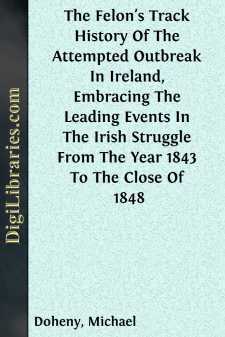Categories
- Antiques & Collectibles 13
- Architecture 36
- Art 48
- Bibles 22
- Biography & Autobiography 813
- Body, Mind & Spirit 142
- Business & Economics 28
- Children's Books 14
- Children's Fiction 11
- Computers 4
- Cooking 94
- Crafts & Hobbies 4
- Drama 346
- Education 46
- Family & Relationships 57
- Fiction 11829
- Games 19
- Gardening 17
- Health & Fitness 34
- History 1377
- House & Home 1
- Humor 147
- Juvenile Fiction 1873
- Juvenile Nonfiction 202
- Language Arts & Disciplines 88
- Law 16
- Literary Collections 686
- Literary Criticism 179
- Mathematics 13
- Medical 41
- Music 40
- Nature 179
- Non-Classifiable 1768
- Performing Arts 7
- Periodicals 1453
- Philosophy 64
- Photography 2
- Poetry 896
- Political Science 203
- Psychology 42
- Reference 154
- Religion 513
- Science 126
- Self-Help 84
- Social Science 81
- Sports & Recreation 34
- Study Aids 3
- Technology & Engineering 59
- Transportation 23
- Travel 463
- True Crime 29
The Felon's Track History Of The Attempted Outbreak In Ireland, Embracing The Leading Events In The Irish Struggle From The Year 1843 To The Close Of 1848
by: Michael Doheny
Categories:
Description:
Excerpt
CHAPTER I
RETROSPECT—COMMENCEMENT OF THE REPEAL STRUGGLE. — ARLY DAYS OF THE ASSOCIATION.
The appearance of this narrative will surprise no one. For apology, if any be needed, the writer may trust to his own share in the transactions with which it deals; and still more so perhaps to the misrepresentation to which, during their progress, he had been personally subjected. But personal vindication imparts neither interest nor importance to history, while it necessarily detracts from its dignity and good faith. Besides, time with the disastrous events marking its more recent course, have silenced the voice of calumny; and the writer undertakes his task with no personal feeling to gratify or even to consult. The character of others, now unable to be heard, is far dearer to him than his own: and while he aspires to justify, before the world, their singular career, distinguished throughout by generous and lofty passions, surpassing intellect and measureless love of their country and countrymen—a career so brilliant and instructive even in the last hours of gloom—he will endeavour to infuse into the history of their struggles and their fate, that generous tenderness toward others, that spirit of self-sacrifice and supreme love of truth, which were among their noblest characteristics.
The undertaking suggests but one painful consideration—the impossibility of treating the subject fully and fairly without investigating facts far anterior to the late struggle, but coincident in their effect with its progress and development, and stamping their pernicious and fatal influence upon the spirit and conduct that led to a final overthrow. This will necessarily involve an inquiry into the late conduct and teaching of Mr. O'Connell, which the writer would most willingly avoid. Mr. O'Connell's name and character fill a mighty space in history. They are the most cherished recollections in his country's memory; and she clings to them with loving pride in this her hour of utter desolation. The hand that traces these recollections would be the last to aim a blow at the object of her sacred affections; and if in obedience to a more binding obligation, Mr. O'Connell's policy be questioned and condemned, his influencing motive shall be unchallenged and unarraigned. What his final purpose was, and how he had determined to effect it, had his life been spared, and his course left unimpeded, now rest with him in his grave. It is for others to write his history and vindicate his career. By me even his mistakes shall be treated with forbearance.
A brief reference to the struggle for Catholic Emancipation becomes here imperative. That struggle has had no equal in history—nor for its moral grandeur, nor for its triumph—but for the singular difficulties which the position of the Irish Catholic imposed on those who engaged in it. It is an error to call it emancipation. It was neither the first nor the last, nor even the most important in the train of concessions, which are entitled to the name of emancipation. The pains and penalties of the "penal laws" had been long abolished, and that barbarous code had been compressed into cold and stolid exclusiveness. But the vices which a long and unrelenting slavery had burned into the character of the country, remained. The lie of law, which assumed the non-existence of the Catholic had infused itself into his nature, and while it was erased from the statute book, it was legible on his heart. That terrible necessity of denying his feelings, his property, his religion and his very being, had stamped its degrading influence on his nature. In a moral sense the law had become a truth—there was no people. The Catholic gentry, giddy by their recent elevation, had only changed for that semblance of liberty their old stern spirit of resistance and revenge. Their new concessions hung gracefully around them, but they were like grafts on an ash stock—their growth was downward, and they wanted the stature and dignity of the native tree. Such were the means at Mr. O'Connell's disposal. His enemies on the other hand were false, powerful, dexterous and unscrupulous. His efforts necessarily partook of the character both of the weapons he was obliged to wield and the foes he struck down. As he advanced to eminence and strength, means, the most crafty and cruel, were taken to overthrow him, every one of which he foiled by a sagacity infinitely above that of his oppressors....


